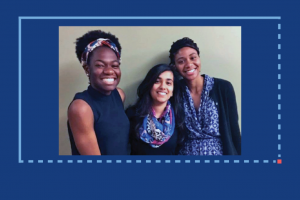
Menti was founded by Edo Ighodaro, Meghna Kumar (who also serves as CEO) and Maya Foster (who also serves as chief technology officer).
Tell us about Menti. What are you working on?
Menti is an online mental health platform for women of color and nonbinary individuals, whose mental health needs are often unacknowledged and left out from traditional platforms and pipelines to care. We empower users with access to culturally competent therapists for one-on-one and group therapy sessions, educational modules, and a community to help them take control of their mental health and thrive.
We address four key pain points for our target group: access, personalization, community and cost.
Access and cost: Since only 12% of therapists in the United States are Black, indigenous or people of color, they can be hard to find. Menti leverages technology to share our diverse therapist database with users who can connect with any therapist of color licensed to practice in their state over teletherapy, rather than keeping them limited to therapists who can see them in person in their area but might not be a good fit or, in many cases, aren’t even taking new clients. Menti also leverages eight-to-12-week group therapy — which has been proven to be as effective but three times more affordable than individual therapy sessions — to increase access to care and create a pipeline to therapy for women of color, something that does not exist on larger, mainstream platforms.
Community: As mentioned above, Menti partners with diverse therapists to bring curated group therapy sessions to our users. Our clients can filter and join open or closed group therapy sessions and become part of a group of women who support each other even in between sessions in a therapist-monitored group chat. Users can submit their own experiences or read about others on our blog community page, where we hope to break down stigma surrounding mental illness for our community.
Personalization and education: Users can filter through the therapist database and groups based on criteria such as ethnic identity, neurodiversity and language. We hold free workshops and educational modules hosted by our therapist partners on topics such as “How to Find the Right Therapist for You” and “How to Decide Between Individual and Group Therapy.”
Why did you decide to start this? Where did the idea come from?
We met while students at Hopkins. Meghna competed in the Stanford BrainStorm pitch competition in December 2019. The competition tasked students with increasing tech uptake by both mental health care providers and patients, and it clicked for Meghna that technology could be useful in increasing access to care for people from marginalized communities who might not feel like they belong on traditional mental health platforms. She pitched the idea and won!
Then, when the pandemic hit in March 2020 and there was a huge increase in online therapy use, Meghna and Edo began to work on Menti more seriously.
With Black Lives Matter and similar movements finally being given the attention they deserve, the team realized that it was more important than ever to make sure women of color and nonbinary people have a formal, therapist-monitored safe place to process their experiences in the United States as people of color.
What would you consider success for Menti? How will the world be different when you are successful?
Through the Social Innovation Lab, we attended an incredibly helpful Impact Measurement workshop that has shaped how we view success. Our short-term goals are to create a pipeline to mental health care for women of color, increase access to specialized educational mental health content for our communities, and reduce search time and stress in finding a care provider. In the medium term, we hope to increase our users’ overall feelings of well-being and feelings of support. And, in the long term, we hope to break down stigmas surrounding mental health for our community.
According to the American Psychiatric Association, roughly 75% of mental illness presents by age 24. We will consider Menti a success if young women of color and nonbinary folks can get the care they need early on, so they can feel supported and thrive throughout their lives.
What have been some of the biggest challenges in scaling your venture during the pandemic?
Since our team is dispersed across the country and world, one of our biggest challenges has been determining individual roles within the team. We’ve tried to work around this by meeting regularly via FaceTime and dedicating meetings to hashing out our roles within Menti.
What advice do you have for would-be social entrepreneurs thinking about starting a venture?
Speak to the community you want to serve to really understand their needs. Even if you’re a part of the community, it’s helpful to get an understanding of different people’s perspectives. At the end of the day, the success of your venture is going to depend on whether the community you’re serving fully embraces your solution, so it’s a good idea to start to earn that trust and support early on.
Why did you apply to SIL? What attracted you to SIL?
We applied to SIL because it provided structured guidance on how to approach social innovation and how to build a socially minded venture in a space (entrepreneurship) that can feel very unstructured at times. SIL has more than exceeded those expectations. One of the main reasons social entrepreneurs should apply to SIL is Madison, the director of the program, who has supported us through everything from logo creation to reaching out to interviewees for customer discovery.
Read more about Menti here. To learn more about the Social Innovation Lab and the 2020–21 cohort, click here. Join them at our virtual SIL Innovators’ Showcase event, 4–6 p.m. on April 27.